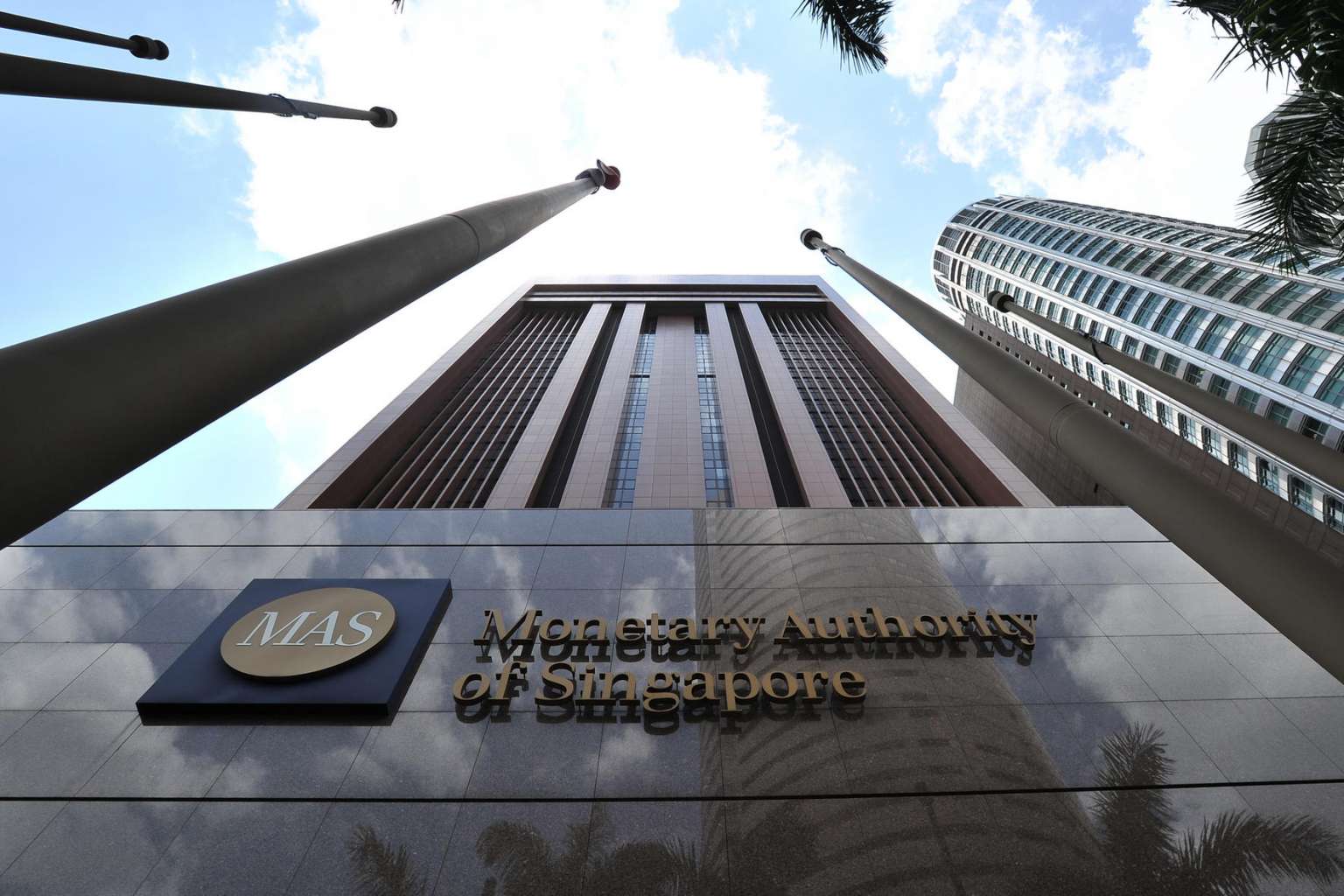Singapore private banks under scrutiny for earning bonuses by selling risky debt: MAS
Sign up now: Get ST's newsletters delivered to your inbox

Facade of the Monetary Authority of Singapore building at 10 Shenton Way.
PHOTO: ST FILE
Follow topic:
SINGAPORE (BLOOMBERG) - Singapore's private banks are coming under scrutiny for earning bonuses by selling risky debt, as the city sees an unprecedented wave of defaults. The The Monetary Authority of Singapore says an industry group is reviewing the practice.
Bond issuers offer banks rebates of as much as 1 per cent as incentive to sell unrated securities, according to a Bloomberg News analysis of figures from bond-sale arrangers and compiled by analysts. The payments, which often aren't explained to the banks' clients, have stoked concerns of a conflict of interest, and Fidelity International has called for the practice to be abolished.
At least half the S$875 million of bonds that have failed since November were sold by private banks earning rebates.
The defaults have further shaken confidence in Singapore's financial markets. A penny-stock crash, close ties between the local unit of a Swiss bank and a disgraced Malaysian state investment firm and raids on brokerages in a market manipulation probe have kept authorities busy. Undeclared bonuses for selling poor quality debt raise another spectre.
MASsaid on Thursday (Aug 25) that there's scope for disclosure on rebates to be clarified.
"Ultimately, safeguards on disclosures complement the broader obligation of private banks to act in the best interests of their clients, taking into account their investment objectives and risk tolerance," MAS said in response to queries. "At the same time, this cannot replace the need for investors to take responsibility for their investments."
Private banks are expected to uphold "rigorous standards" in dealing with their clients, and that includes disclosing key terms of transactions, fees and conflicts of interest, the regulator said.
"The private bankers are supposed to look after their clients' interests but this may cause them to put the issuers' interest and their own interest first," Mak Yuen Teen, co-director of the Corporate Governance and Financial Reporting Centre at the National University of Singapore, said, speaking of the rebates. "It poses a conflict."
Private banks took up 49 to 92 per cent of the unrated notes issued by PT Trikomsel Oke, Pacific Andes Resources Development Ltd and Swiber Holdings Ltd in their sales from April 2013 to October 2014, the Bloomberg News analysis shows. These three companies have defaulted on their bond obligations since November.
"The practice of sales concessions is not unique to Singapore but is also practiced in other global financial centers," Tan Su Shan, co-chair of MAS's private banking industry group said in a separate statement on Thursday. "There is no explicit requirement currently for distributors to declare the amount of sales concessions received. Some distributors do and others do not."
There is scope to enhance disclosure to clients, said Ms Tan. The industry group is reviewing the code to require private banks to disclose fees and charges on investment products and services, including bond sales concessions, she said.
Ms Tan is also group head of consumer banking and wealth management at DBS Group Holdings, Southeast Asia's biggest lender.
The rebates helped fuel a boom in the local debt market as Singapore's millionaires hunted for higher yields in a low- interest world. Sales of non-bank corporate debt in the five years through 2015 rose by almost half over the previous five years. But paying bankers for selling unrated securities suggests that issuers had to try hard to find buyers for their debt.
"A rebate is given on poor quality credit as a general rule," said Bryan Collins, a Hong Kong-based portfolio manager at Fidelity International, which has US$273 billion of assets under management.
The practice increased starting in 2012 as a flurry of new names sought capital and investors, Mr Collins said. "These sorts of rebates should be abolished and shouldn't be standard practice, because not all investors who participate in these deals are treated equally."
MAS said it will continue to work with the industry to help improve secondary market liquidity.
While private banks in Asia don't publish statistics related to the rebates, bonuses ranged from as high as 1 per cent to 0.1 per cent, according to the Bloomberg News analysis. That means that while institutional investors subscribe at 100 cents on the dollar, wealth managers pay 99 cents to 99.9 cents to the issuers, assuming no other costs.
The Asia Securities Industry and Financial Markets Association, a Hong Kong-based industry group, recommends that commissions, including the rebates, be disclosed in a bond's offering documents, executive director Vijay Chander said by e- mail.
"It can be a moral hazard. Do we need to do that to attract investors?" said Raymond Chia, Singapore-based head of credit research for Asia excluding Japan at Schroder Investment Management Ltd.

